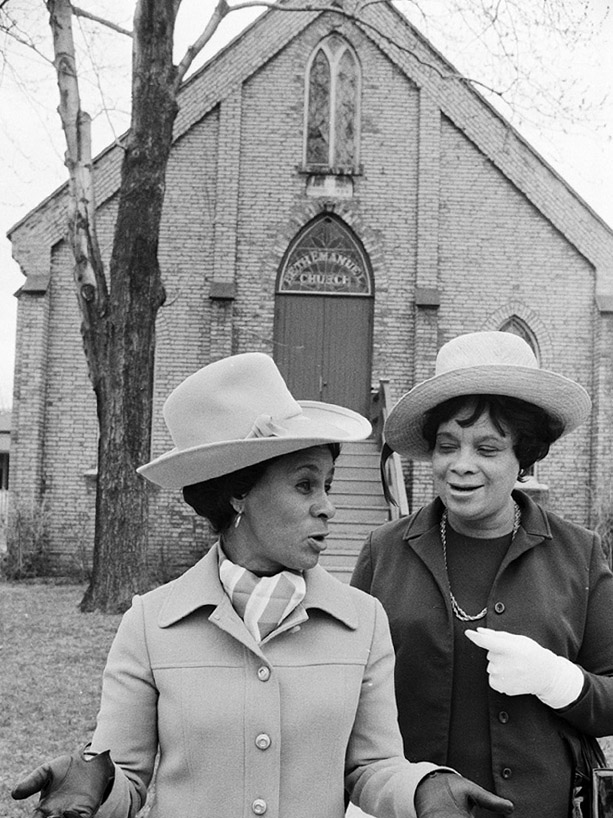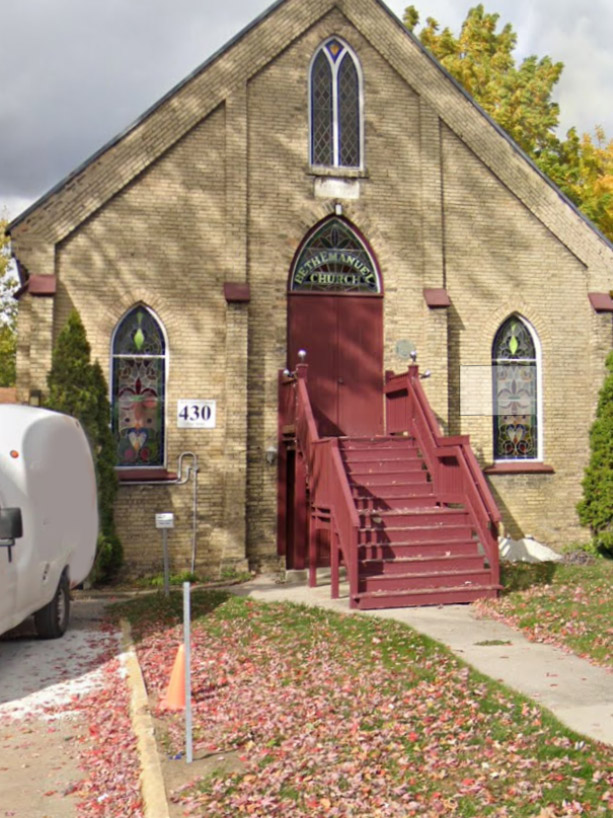Kay Livingstone
Kay Livingstone, left, and her sister Mrs. Evelyn Johnson in front of Beth Emanuel Church.
Born in 1918, Kay was one of eight children born to James and Christina Jenkins. Her father was a juvenile court judge in London, and was largely responsible for the founding of the Canadian League for the Advancement of Coloured People, in London, in 1924, as a way "to improve the condition of the coloured people of Canada.” The League had an official newspaper, The Dawn of Tomorrow, which Jenkins had founded in 1923. The Dawn brought the Black communities in Ontario towns and cities closer together by listing their activities in columns of social and church notices.
James Jenkins died suddenly following surgery in 1931. His widow Christina (later Mrs. Frank Howson), who had, from the beginning, supported and encouraged her husband’s work, carried on the publication of The Dawn of Tomorrow with the help of her family.
With her parents as an inspiration Kay spent much of her life founding and leading a number of organizations involved in fighting racial discrimination and giving a voice to the Black community’s interests and concerns.
From a young age, she developed an interest in the performing arts, studying music in Toronto and Ottawa. In 1942, she married George Livingstone, and they moved to Toronto where they raised their children. Not confined to the family home, Livingstone maintained a brilliant acting career. She was called "one of Canada’s leading Black actresses” during this time, performing in both amateur and professional productions and having a career in radio.
In the 1950s, as the civil rights movement gained momentum in the United States, Livingstone’s thirst for action and change transformed her social gatherings into a mutual aid association called the Canadian Negro Women’s Association. She served as its first president, from 1951 to 1953, and remained an active member afterward. Livingstone provided the organization’s vision to promote the pride and the contributions of the African Canadian community. Through this organization, Livingstone initiated and organized the first National Congress of Black Women, held in Toronto in April 1973. This filled a void on the political spectrum, as African Canadian women’s concerns were lesser priorities for both the Black civil rights movement and the second wave feminists. Given the event’s success, other conventions followed in cities across Canada, which led to the creation of the permanent organization that exists today.
She worked to involve the nation in a dialogue on the role of women and African-Canadians as a consultant for the Privy Council of Canada. In 1975, during the United Nation’s International Women’s Year, she travelled the country with a plan to organize a national conference of women who belong to a visible minority. Livingstone died suddenly in the summer of 1975, leaving the Black community in a state of shock. Her story is one of a fighter who worked tirelessly for the African-Canadian community and for the betterment of society.
(Reproduced from the designation of Kathleen 'Kay' Livingstone as a National Historic Person by the Government of Canada, 2011).
Born in 1918, Kay was one of eight children born to James and Christina Jenkins. Her father was a juvenile court judge in London, and was largely responsible for the founding of the Canadian League for the Advancement of Coloured People, in London, in 1924, as a way "to improve the condition of the coloured people of Canada.” The League had an official newspaper, The Dawn of Tomorrow, which Jenkins had founded in 1923. The Dawn brought the Black communities in Ontario towns and cities closer together by listing their activities in columns of social and church notices.
James Jenkins died suddenly following surgery in 1931. His widow Christina (later Mrs. Frank Howson), who had, from the beginning, supported and encouraged her husband’s work, carried on the publication of The Dawn of Tomorrow with the help of her family.
With her parents as an inspiration Kay spent much of her life founding and leading a number of organizations involved in fighting racial discrimination and giving a voice to the Black community’s interests and concerns.
From a young age, she developed an interest in the performing arts, studying music in Toronto and Ottawa. In 1942, she married George Livingstone, and they moved to Toronto where they raised their children. Not confined to the family home, Livingstone maintained a brilliant acting career. She was called "one of Canada’s leading Black actresses” during this time, performing in both amateur and professional productions and having a career in radio.
In the 1950s, as the civil rights movement gained momentum in the United States, Livingstone’s thirst for action and change transformed her social gatherings into a mutual aid association called the Canadian Negro Women’s Association. She served as its first president, from 1951 to 1953, and remained an active member afterward. Livingstone provided the organization’s vision to promote the pride and the contributions of the African Canadian community. Through this organization, Livingstone initiated and organized the first National Congress of Black Women, held in Toronto in April 1973. This filled a void on the political spectrum, as African Canadian women’s concerns were lesser priorities for both the Black civil rights movement and the second wave feminists. Given the event’s success, other conventions followed in cities across Canada, which led to the creation of the permanent organization that exists today.
She worked to involve the nation in a dialogue on the role of women and African-Canadians as a consultant for the Privy Council of Canada. In 1975, during the United Nation’s International Women’s Year, she travelled the country with a plan to organize a national conference of women who belong to a visible minority. Livingstone died suddenly in the summer of 1975, leaving the Black community in a state of shock. Her story is one of a fighter who worked tirelessly for the African-Canadian community and for the betterment of society.
(Reproduced from the designation of Kathleen 'Kay' Livingstone as a National Historic Person by the Government of Canada, 2011).


